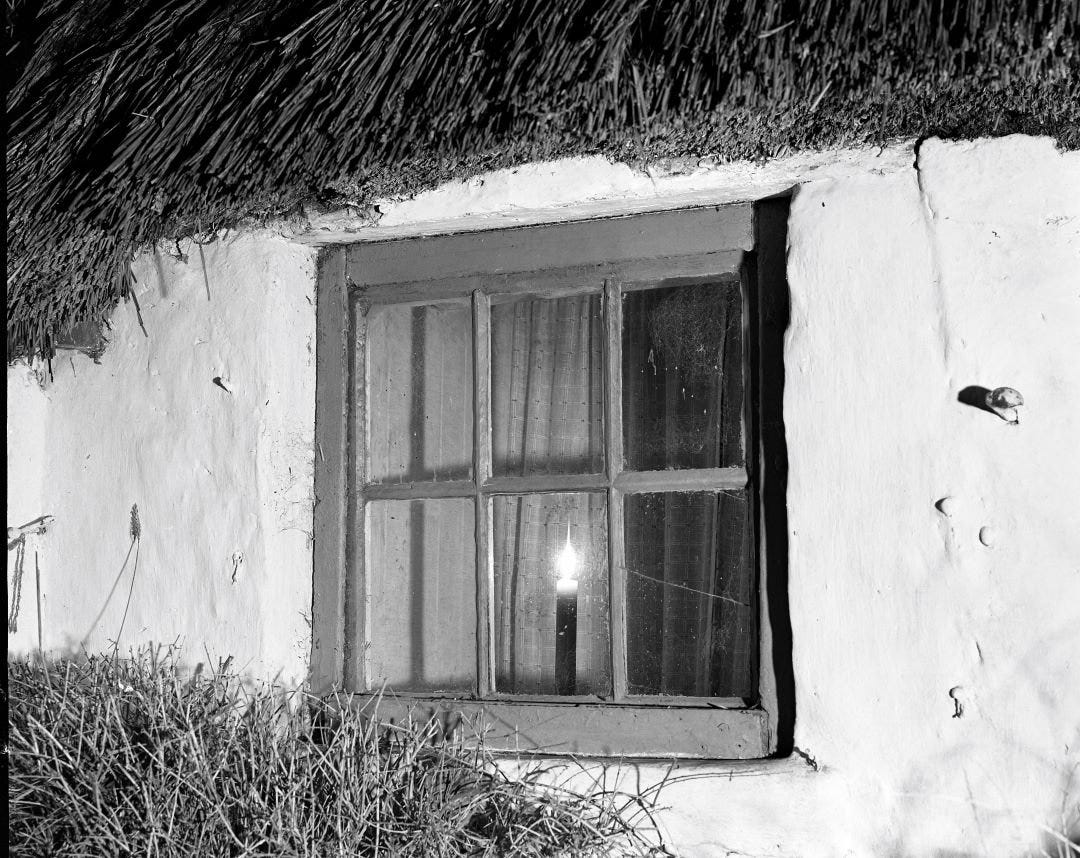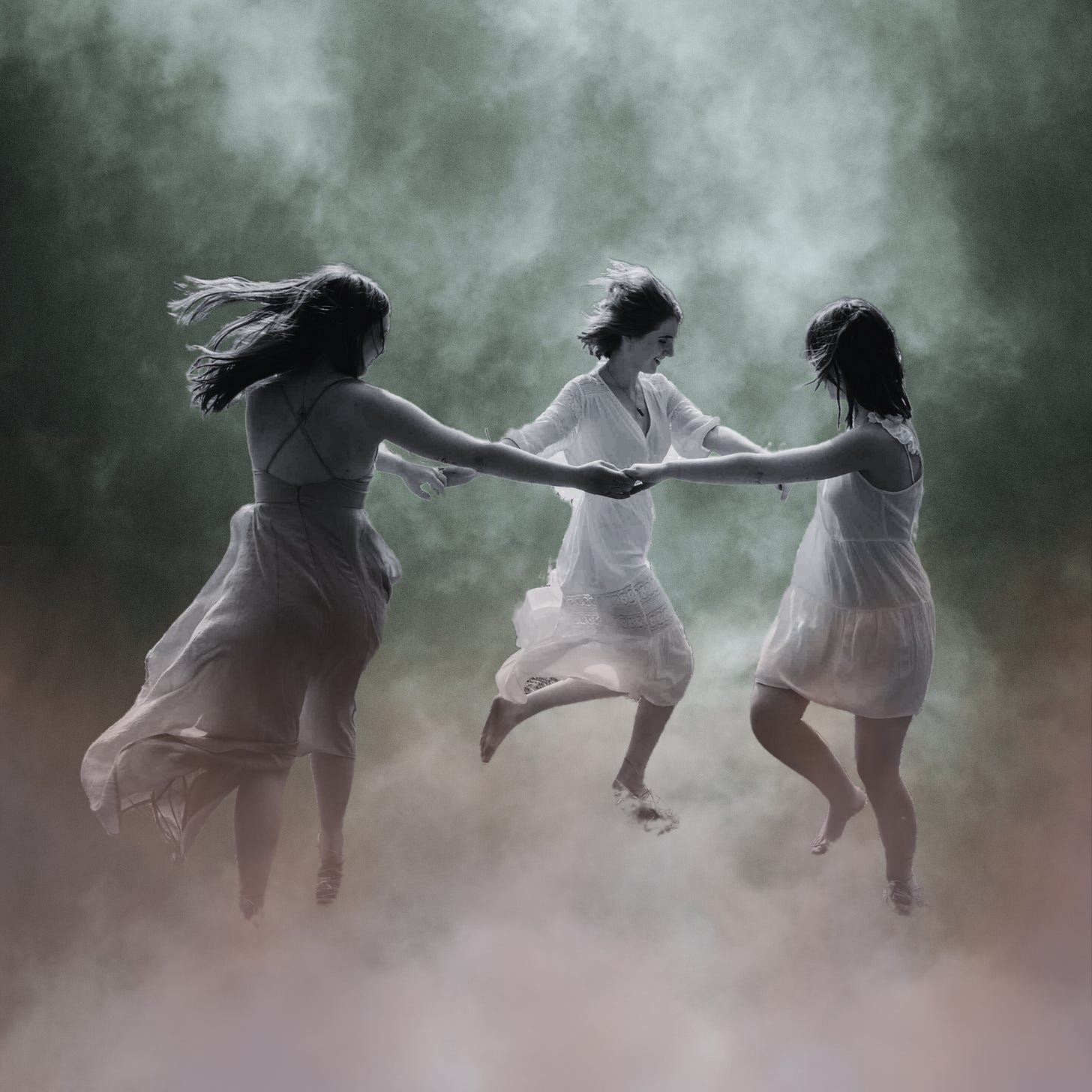Nollaig na mBan: Women's Christmas
Remembering and Reimagining this 6th January. Imbas Dispatch #14
A Chairde, Friends,
After today, it is officially safe to take down your Christmas tree in Ireland without being cursed, at least according to my mother, anyway. It’s tradition to leave it up until Nollaig na mBan, ‘Women's Christmas’, also known as ‘Little Christmas’, arrives. My tree got taken down on Saturday, as the local scout troop was collecting it as part of their annual fundraising activities. To be honest, it had wilted forward so much by the turn of the year, it looked like it might attack one of us in an ornamental onslaught. My mother would be willing to take that risk; I was up at my folks’ yesterday, and sure enough, all decorations are still proudly shining. A curse-free household.
Nollaig na mBan has always been a feature of my family traditions. It’s an age-old Irish celebration of women’s hard work and a reminder that women sacrifice so much that is taken for granted. It falls on the last day of Christmastide, on the Feast of the Epiphany. The Greek roots of epiphany mean ‘to appear’, ‘to manifest’, and Nollaig na mBan is about women manifesting a version of Christmas just for themselves.

Remembering
With its roots in a patriarchal culture, Nollaig na mBan meant that gender roles were reversed. Men took over the household duties while women rested and gathered with friends, often down at the local or for a cup of tea and cake. It was celebrated in recognition of women’s hard labour over the Christmas season. This is a quote from the 1930s, gathered from our national folklore database:
‘The women used to claim this Christmas as their own. The feastings of Christmas were carried out but on a smaller scale. This feast was called in Irish “Nollaig na mBan”. The men used to say “Nollaig na mBan, Nollaig gan mhaith”, but women used to say “Nollaig na mBan, Nollaig go maith”.’
Dúchas, The School’s Collection, Volume 0917
This translates as men saying that Women’s Christmas isn’t good, given the lack of feasting, with women retaliating by saying that their tradition is a good Christmas. Indeed, women’s magic came to life at this time.
It was said that all the well water in Ireland would turn into wine at midnight on Women’s Christmas. No one was permitted to go out to observe this phenomenon or sample the well water, or they would be met with terrible luck. We can see the overt Christian but also Pagan overtones in this belief. Wells are associated with the feminine mysteries, many are named after Goddess and Saint Brigid, they are places where illness is transformed into cure, and it is from the well that out flows imbas, otherworldly wisdom.
Another healing symbol of Nollaig na mBan is a common cleansing ritual where mothers would rub the tails of herrings across the eyes of their children to give them immunity against disease, keeping their families and communities safe during times of pestilence.
In yet another ritual, women made ‘cakes’ of clay or mud, into which were placed candles named after each member of the family. The order in which these candles went out predicted the order in which the family members would die. In a version of this, family members would light their own candles and place them in the window as a symbol of protection. In this way, Nollaig na mBan not only protects the family from death but acknowledges the greatest of all mysteries on a day of feminine celebration: death’s natural place in the great cycle of life.
Reimagining
In these times, given the rush to polarise and sever, we could do away with a tradition that originated out of necessity for women who were oppressed into domestic roles. But if we did, then we wouldn’t remember, and I want to remember. In the poem she wrote to honour 100 years of Irish women's suffrage, Eavan Boland said:
‘No one is left behind or should be
As we honour this centenary:
A hundred years ago a woman’s vote
Becoming law became the right
Of Irish women. We remember them
As we celebrate this freedom.
Freedom is not abstract, is not a concept,
Is not an ethic only nor a precept.
It can also be a hope raised then defeated
Then renewed. It can be a voice braided
Into the silences of other women
Who came before.’
From ‘Our future will become the past of other women’ by Eavan Boland
Celebrating Nollaig na mBan is both an act of remembrance and of evolution, of inviting memory to grow into new life, something reimagined that is ripe for us, as our future will one day become the past of other women. It’s heartening to see so many events happening across Ireland today and this week in celebration of women.
This evening, I will be joining women down the pub for an event organised by a local women’s group led by Patricia Langton, author of Stones in My Bones. We’ll be celebrating Nollaig na mBan through a series of women’s performances, including three monologues from the award-winning play ‘Little Gem’ by Dublin playwright Elaine Murphy, first produced in the Dublin Fringe Festival in 2008. It tells the hysterical and poignant story of three generations of Dublin women, Kay, Lorraine and Amber.
Today, Nollaig na mBan will be a “Nollaig go maith”, a good Christmas.
Journal Prompt
A two-fold journal prompt for you:
What feminine wisdom have you inherited from the women in your lineage or wider circles? What traditions or mysteries or stories did they gift you?
If you were to create your own Nollaig na mBan, ‘Women’s Christmas’, tradition to pass on to the generations to come, what would this look like? What would you want to celebrate and remember? Could you bring this to life in some way while the energy is alive this week?
Join our Community
In the spirit of community this Nollaig na mBan, if you are not yet a member of The Celtic Creatives, this is an invitation to become one. My vision is for this to be a sacred place of belonging where you discover lost parts of yourself through Celtic mysticism.
Each month, we have live gatherings like the Full Moon Fairytale Céilí, a creative ritual rooted in Celtic wisdom to help you break free from the oppression of modern life, and a growing eBook of Mythic Ancestors—Celtic goddesses and gods for you to work with to guide your life at this time.
For founding members, there is an additional New Year bonus workshop this month on aligning your creative or life projects to the wisdom of the Celtic Calendar.
You can join from just €10 per month. Prices will go up mid-January, so this is the last opportunity to join at this price point (if you are already a member, your membership cost will remain the same).'
Until we gather again at the well,
Croí isteach,
Jen x
Sources:
Irish Customs and Rituals: How our ancestors celebrated life and the seasons by Marion McGarry











As an English woman I had never heard of Women's Christmas, so thank you for sharing. What a wonderful tradition and at the perfect time, after the busy Christmas season. It feels that it is still so relevant in these times when women's rights are being pushed back.
Also I wanted to say that I loved your idea of 'audacious energy' in this morning's writing hour. I am going to contemplate on that today, thank you!
Absolutely loved this read! Thank you!